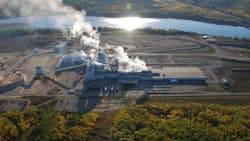Mercer Advancing Early Engineering on Proposed Carbon Capture Project at Alberta Paper Pulp Mill
Forestry products firm Mercer International has moved forward with Svante Technologies to begin pre-construction engineering and design work on a proposed carbon capture and storage project at Mercer’s 35-year-old paper pulp mill in Alberta, Canada.
Svante will help Mercer in advancing the project to the front-end engineering and design phase 2 for the CCS work at the Peace River pulp mill, where biomass fiber is sourced from managed forests. The work on the phase 2 will focus on developing integrated design, cost estimates and risk assessments for the carbon capture and storage.
Energy Transition in the Paper and Pulp Industries
Read more in EnergyTech.com
Once implemented, the project will capture emissions from the Peace River operations utilizing Svante’s sorbent filter system to capture carbon dioxide molecules and then store the C02 to reduce greenhouse gas emissions. The project is still awaiting a final investment decision.
"The collaboration with Svante reflects Mercer's drive to pursue climate innovation opportunities that align with our business goals,” Bill Adams, chief sustainability officer at Mercer, said in a statement. “Examining carbon capture in a commercial mill setting gives us a valuable opportunity to assess its long-term potential—both for our own operations and for advancing decarbonization pathways across the industry.”
The Mercer Peace River mill is located in the boreal forest region of Alberta, some 500 kilometers north of Edmonton. The pulp mill began producing both softwood and hardwood pulp in 1990 and uses biomass to fuel its own energy production at a capacity of 65 MW, the company reports.
Beneath the surface of Alberta are geologic reservoirs capable of securely storing CO2, according to the companies. The success of carbon capture technologies would allow power generators to continue with baseload and fossil-fueled power plants while reducing industrial emissions.
In the United States, 208 paper and pulp factories nationwide emitted about 32 million metric tons of CO2 equivalent in 2023, according to federal statistics reported by the Environmental Protection Agency in August 2024.
About the Author
EnergyTech Staff
Rod Walton is senior editor for EnergyTech.com. He has spent 17 years covering the energy industry as a newspaper and trade journalist.
Walton formerly was energy writer and business editor at the Tulsa World. Later, he spent six years covering the electricity power sector for Pennwell and Clarion Events. He joined Endeavor and EnergyTech in November 2021.
He can be reached at [email protected].
EnergyTech is focused on the mission critical and large-scale energy users and their sustainability and resiliency goals. These include the commercial and industrial sectors, as well as the military, universities, data centers and microgrids.
Many large-scale energy users such as Fortune 500 companies, and mission-critical users such as military bases, universities, healthcare facilities, public safety and data centers, shifting their energy priorities to reach net-zero carbon goals within the coming decades. These include plans for renewable energy power purchase agreements, but also on-site resiliency projects such as microgrids, combined heat and power, rooftop solar, energy storage, digitalization and building efficiency upgrades.
